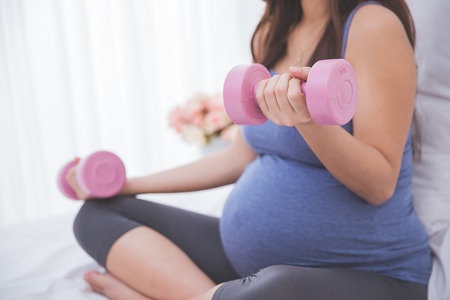
Exercising while pregnant offers multiple health benefits. It may decrease your risk of gestational diabetes (diabetes that develops during pregnancy) or preeclampsia (a condition leads to high blood pressure in pregnant women). Staying active while pregnant may also reduce back pain, assist in controlling weight gain and promote healthy weight loss after delivery.
Before starting an exercise routine, it’s important to talk with your OBGYN. Generally speaking, if you have been physically active before pregnancy you should be okay to continue exercise throughout your pregnancy, with a few modifications, since pregnancy can affect your body in the following ways:
- Joints – some of the hormones released during pregnancy can cause changes to ligaments, which may make your joints more flexible and prone to injury
- Balance – the changes to your body and additional weight in your front causes a shift in your center of gravity, leading to challenges with balance
- Breathing – during pregnancy your body requires more oxygen, this can cause shortness of breath during exercise, and, as the baby grows and develops, there may be increased pressure on your diaphragm, which can also cause shortness of breath
Because of these changes, it is important to focus on lower impact exercises (e.g. walking, swimming, tennis, or riding a stationary bike) and avoid contact sports (e.g. basketball, soccer, or boxing) or activities that have a high risk of falling (e.g. skiing, gymnastics, or horseback riding). Exercise in a hot or humid environment, including hot yoga,should be avoided because it may put extra stress on your pregnant body.
If exercise is new to your routine, talk to your obstetrician about developing an exercise plan. It’s best to start slowly and gradually increase. Begin with a low impact exercise (e.g. walking) for 5 minutes and increase in 5-minute increments each week until you are able to sustain 30 minutes of exercise.
Stop exercising and speak to you OBGYN, if you experience any of the following symptoms:
- Vaginal bleeding
- Lightheadedness or dizziness
- Chest pain
- Headache
- Weakness
- Regular, painful contractions
Some complications make exercising while pregnant unsafe, so women with the following complications should avoid exercise and speak to their OBGYN:
- Preeclampsia
- Multiples and risk factors for premature labor
- Weak cervix
- Bleeding/spotting
- Low placenta
Exercising while pregnant is healthy for both you and your baby. Maintaining a fitness routine throughout pregnancy can increase your energy level, help you sleep better and may even reduce the length of active labor. For added benefit – encourage your partner and family to get involved, too.





